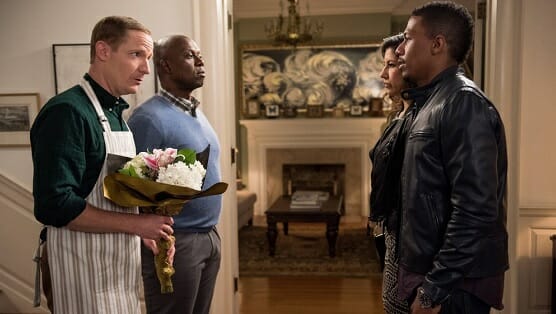Brooklyn Nine-Nine: “AC/DC”
(Episode 2.20)

We now break our usual third-person omniscient mode in service to a desperate first-person plea: Can somebody please make me a pair of .gifs of Rosa’s and Holt’s amazing mid-episode reaction shots during their ill-fated double date with Marcus and Kevin? Stephanie Beatriz and Andre Braugher are both great at wry humor and articulating hilarity through facial tics, so seeing their talents in action isn’t “new,” per se. But in “AC/DC,” Rosa’s petrified response to Kevin’s innocuously prying personal questions, and Holt’s uncharacteristically bug-eyed reply to her pregnancy scare might rank among their best work on Brooklyn Nine-Nine to date (which is saying quite a lot).
But that just speaks to how great “AC/DC” is on the whole. While Rosa and Holt find themselves in a hilarious pickle, their contretemps plays as a side dish to the episode’s equally hilarious A-plot, in which Jake acts stubborn and causes problems for Terry. (Obviously.) If you’ve been missing Brooklyn Nine-Nine these past few weeks, and if you feel that the show’s second season hasn’t been as consistent as its first, then “AC/DC” will come as a huge relief. In fact, from story to punchlines, it might be the strongest outing that Brooklyn Nine-Nine has output in its sophomore go-round, right up there with “Captain Peralta,” “Stakeout,” and “The Pontiac Bandit Returns.” In fairness, absence does make the heart grow fonder, but “AC/DC” would be outstanding even without the month-long hiatus.
The episode divides the cast into two separate camps. In the first we have Jake, Boyle, and Terry, with the latter two doing their damndest to keep Jake out of the office and off the job after he sustains an injury during a bitchin’ foot chase on New York City’s gridlocked streets. In the second we have Holt and Rosa, forced to endure non-work interaction, courtesy of their respective significant others’ dinner party machinations; we also have Amy and Gina, whom Holt invites to the soiree as social buffers. In both scenarios, we’re witness to these characters’ inability to divorce themselves from their careers. Jake tricks Boyle into a jaunt to Atlantic City under the pretense of catching some R&R, but he drags his partner to New Jersey to apprehend the perp we see them tailing in the episode’s opening sequence. Holt and Rosa, on the other hand, scheme and toil to talk about anything but themselves when in private company.
-

-

-

-

-

-

-

-

-

-

-

-

-

-

-

-

-

-

-

-

-

-

-

-

-

-

-

-

-

-

-

-

-

-

-

-

-

-

-

-








































